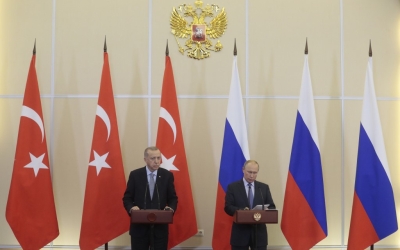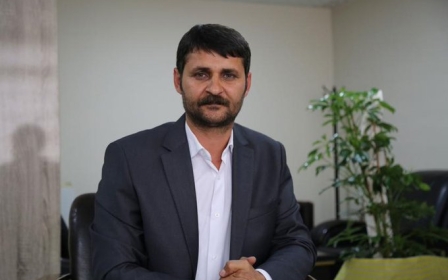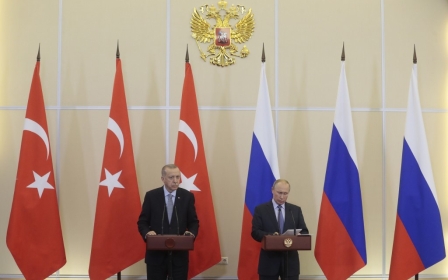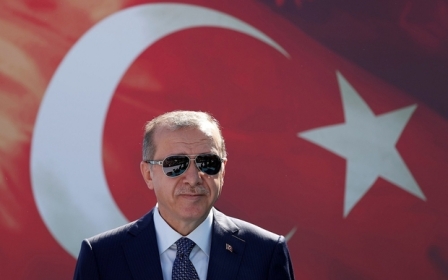Russia informs Turkey that Kurdish fighters have left Turkish border zone in Syria

Russia has informed Turkey that Kurdish fighters have withdrawn from the Turkish border area in northern Syria, Turkey's president said, fulfilling a key component of a deal reached last week between Ankara and Moscow.
Speaking at an event in the Turkish capital on Tuesday, Recep Tayyip Erdogan said Russia told the Turkish authorities that the Kurdish fighters "have fully withdrawn" from the border area, as reported by Reuters.
Erdogan said talks would continue with Russia on Wednesday, the news agency said.
"Russia has conveyed to our relevant authorities that terrorist organisations have fully withdrawn from [the border area]," Erdogan said in a speech at a celebration marking the anniversary of the Turkish Republic.
"Of course, our talks [with Russia] will continue tomorrow as before," he added.
New MEE newsletter: Jerusalem Dispatch
Sign up to get the latest insights and analysis on Israel-Palestine, alongside Turkey Unpacked and other MEE newsletters
The Turkish president and his Russian counterpart Vladimir Putin came to an agreement on 22 October to see the withdrawal of Syrian-Kurdish forces from areas along the Turkish border.
The deal gave Kurdish People's Protection Units (YPG) fighters in northern Syria 150 hours - just over six days - to pull back by about 30km from the Turkish border.
It also included plans for joint Russian-Turkish patrols within a 10km area on the Syrian side of the border.
Russia's defence ministry, citing Major General Yuri Borenkov, a senior military official working on Syria, said 68 Kurdish defence units comprising 34,000 people had left the "safe zone" with their weapons and equipment by the deadline, Reuters reported.
A Russian delegation is currently in Turkey to discuss how the joint patrols will operate, the news agency said.
"Joint patrols will start soon," Turkish Defence Minister Hulusi Akar said on Tuesday evening.
Later, Turkey's defence ministry also said that reconnaissance flights and mine-clearing operations had begun within the 10km zone inside Syria.
Ankara considers the Syrian-based YPG to be an offshoot of the outlawed Kurdistan Workers' Party (PKK), which has waged a decades-long insurgency against the Turkish state and is designated as a terrorist group by several countries.
The Turkish military launched an offensive in northern Syria to root out YPG fighters earlier this month, shortly after US President Donald Trump announced plans to pull American troops out of the area.
That decision was met with sharp criticism in Washington, where politicians from both major political parties accused the US president of abandoning the country's Kurdish allies.
The YPG is the largest faction within the Syrian Democratic Forces (SDF) militia, which was backed by the US and credited with leading the fight against the Islamic State (IS) group in the war-torn country.
'Dangerous situation'
While Turkey agreed on 17 October to stop military operations in northern Syria at the behest of the US, Syrian Kurdish fighters last week accused Ankara of continuing to take action in the area.
On 24 October, the commander of the SDF, Mazloum Abdi, called for the ceasefire's backers to "rein in the Turks".
"In spite of the Turks announcement of the end of military operations, they and their jihadists continue to violate and launch attacks on the eastern front of the Serekaniye," Abdi tweeted, using the Kurdish name for Syrian border town Ras al-Ain.
'We are concerned by the continuing dangerous situation in northeast Syria, that's why we continue to call on the Turkish side to fully implement the provisions of the ceasefire agreement'
- Joel Rayburn, US special envoy for Syria
On Tuesday, the UK-based Syrian Observatory for Human Rights said that "heavy fighting erupted for the first time" between Turkish and Syrian government forces in northern Syria.
Later in the day, Turkey's defence ministry said it had captured 18 people around Ras al-Ain after they were suspected of being part of Syrian government forces.
The people "were captured alive in the southeast of Ras al Ain during the search/ detection/ reconnaissance/ security activities", the ministry said on Twitter, as reported by Reuters.
"The issue is being examined and coordinated" with the Russian authorities, it added.
Kurdish forces had struck an agreement with Damascus earlier this month allowing pro-government troops return to some SDF-controlled areas to avert Ankara's assault.
The Trump administration's special envoy for Syria, Joel Rayburn, voiced concern on Tuesday at what he described as a "continuing dangerous situation in northeast Syria", as reported by Reuters.
"We are concerned by the continuing dangerous situation in northeast Syria, that's why we continue to call on the Turkish side to fully implement the provisions of the ceasefire agreement of October 17th," Rayburn told reporters in Geneva.
Erdogan and US Vice President Mike Pence announced a ceasefire deal earlier this month to allow Kurdish fighters to leave the areas along the Syrian-Turkish border.
Trump later lifted US sanctions on Turkey that were imposed after the country launched its Syria offensive, praising the ceasefire agreement.
Rayburn on Tuesday called on the Syrian government and its key backer, Russia, "to exert their influence over the regime forces not to allow the situation in the northeast to flare up into a new conflict that could destabilise the country further".
Middle East Eye delivers independent and unrivalled coverage and analysis of the Middle East, North Africa and beyond. To learn more about republishing this content and the associated fees, please fill out this form. More about MEE can be found here.





